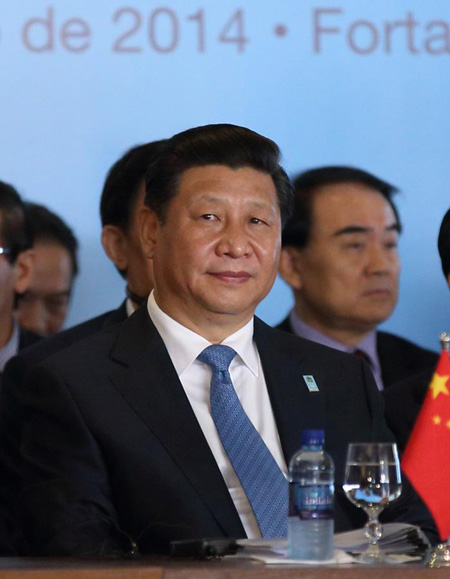Xi: Cyberspace sovereignty ‘should be respected’
 0 Comment(s)
0 Comment(s) Print
Print E-mail China Daily, July 18, 2014
E-mail China Daily, July 18, 2014
 |
|
Chinese President Xi Jinping attends a dialogue between BRICS countries' leaders and presidents from 11 South American nations, in Brasilia, Brazil, July 16, 2014. [Photo/Xinhua] |
President Xi Jinping called for respect of all countries’ cyberspace sovereignty on Wednesday, telling the Brazilian congress that “there are no double standards in the information sector, and every country has the right to preserve its own information security".
Xi’s remarks were made amid continuing revelations about extensive spying by the United States on other countries, including China, Brazil and Russia, and even some US allies.
During the 30-minute speech, Xi said the Internet’s rapid development poses new challenges to the sovereignty, security and interests of a country, and should be handled seriously.
Although the Internet is highly globalized, the sovereignty of the information of all countries should be respected, Xi said.
"No matter how developed a country’s Internet technology is, it must not violate the information sovereignty of others”.
Xi called for the establishment of a joint international system of governance to achieve a peaceful, secure and open cyberspace. Such a system should feature multilateral cooperation, democracy and transparency, he said.
The statement was part of a broader message in which Xi emphasized that China and Brazil should take on more international responsibility as major emerging economies.
Brazilian President Dilma Rousseff canceled a planned state visit to the US last year after documents provided by former US intelligence contractor Edward Snowden revealed that the US National Security Agency had intercepted her personal e-mails and targeted the communications of Petrobras, the Brazilian state oil company.
Rousseff sponsored a debate about online spying at the UN General Assembly that ended in December with the adoption of a resolution reaffi rming the right to Internet privacy.
In the just-concluded BRICS summit of leaders from Brazil, Russia,India, China and South Africa, a joint declaration issued on Tuesday said the five countries agreed that “it is necessary to preserve information and communication technologies, particularly the Internet, as an instrument of peace and development and to prevent its use as a weapon.”
Joao Nogueira, former president of the Institute of International Relations of Pontificia Universidade Catolica do Rio de Janeiro, said, “It is a very important moment for President Xi Jinping to mention this issue in the BRICS summit because it can help to push the situation ahead. And Brazil is in line with China’s stand.’’
Nogueira said it is important to build a more multilateral governance of the Internet, such as introducing the UN into the system.





